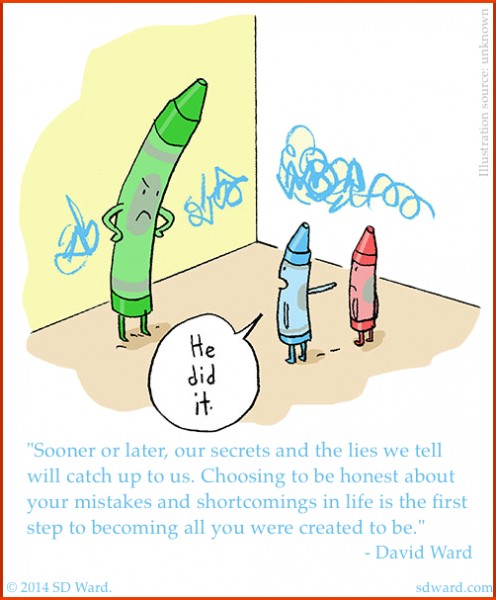They Do What We Do, Not What We Say
There are only a few things that God hates. Included in these is lying. Scriptures teach us that,
“There are six things which the LORD hates,
Yes, seven which are an abomination to Him:
Haughty eyes, a lying tongue,
And hands that shed innocent blood,
A heart that devises wicked plans,
Feet that run rapidly to evil,
A false witness who utters lies,
And one who spreads strife among brothers.” (Proverbs 6:16-19)
 This photo is the tickler for this article in that it begs to be asked, “How did the green Crayon, who is obviously an authority figure in the little blue and red Crayon’s lives, teach the importance of telling the truth?” Was it just said, or did telling the truth get lived out? Sadly, such is the reality of our culture today. In our culture – a society that says situational ethics are acceptable – lying has become a part of our daily lives.
This photo is the tickler for this article in that it begs to be asked, “How did the green Crayon, who is obviously an authority figure in the little blue and red Crayon’s lives, teach the importance of telling the truth?” Was it just said, or did telling the truth get lived out? Sadly, such is the reality of our culture today. In our culture – a society that says situational ethics are acceptable – lying has become a part of our daily lives.
The kind of lying I am speaking of is the less noticeable lying. It’s not the blatant lying, but the little white lies – those deceptions and untruths, or stretching of the facts that we do so that we don’t have to face the full consequence of our own rebellion toward God, selfishness, shortcomings, character flaws, or sin. They are the kinds of lies that those who follow us or seek to emulate our actions and character, often pick up on even if we thought we were being unobvious or doing things under the radar.
This predisposition to lying that we all have as humans, is the attitude that we take when we say things to ourselves or others like the, “No one will ever know, so I can do it,” sort of lies, the “What I do in my personal life is no one else’s business but my own,” the “Everyone else does it, even Christians, so why should I not be able to,” lie, or the “It’s OK not to report all of my income, because the government is too greedy anyway,” sort of lies we have all been guilty of at one time or another that we tell ourselves or others. Even the most common lie of all (at least in my opinion), when someone asks you how you are doing and you say, “OH! I am doing great,” when inside you are doing terrible, feeling badly, and struggling just to get through the day.
All these lies aside for the moment, what does lying say about our character? Even more so, what is the affect of this sort of slippery character on those who look up to us, those who are following after us, or those we have been entrusted as stewards over – like children for instance.
Jon Lash, one of the many awesome pastors at Greenhouse Church in Gainesville Florida shared a message from the pulpit this past Sunday that really knocked one out of the park as it relates to personal responsibility. Among the many great points that he challenged me with, the one nugget that really stood out to me was the one about how we live our lives in relationship to those we have influence over. He specifically spoke of how children may hear what we say, but they most often emulate what they see us do. Did you get this? They do what we do, not what we say.
Equally as important – and I speak from personal experience – is our integrity before our children. If we want to have real and lasting relationships with our children (or anyone for that matter), we must be willing to be transparent with them about our failures, flaws, and shortcomings – even our sins. Yes, it may leave a sting or even a wound that will take time to heal in their hearts until they learn what forgiveness looks like, but the lesson they will learn in taking responsibility for their actions in life will be the best lesson you can teach them.
You are a leader in this life. You are leading people, whether you see it or not. They are listening and they are watching. Decide today, whether you have children or not, that you will begin to be honest with yourself and others, and live above the level of mediocrity that has so permeated the world we live in. Let your life be lived in such a way that if others follow after you, that their lives will be exemplary lives in both their character and in their impact on the world they live in.



